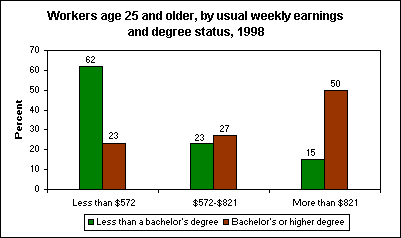An official website of the United States government
 United States Department of Labor
United States Department of Labor
Is it possible for a worker to have high earnings without a bachelor's degree? For a small proportion of workers without a degree, the answer is "Yes."

[Chart data—TXT]
Last year, the median earnings for all college graduates were $821 a week. Of full-time workers age 25 and older without a bachelor's degree, 15 percent earned more than $821 a week in 1998. However, 62 percent of workers without a degree had weekly earnings below $572 per week, which was the median for all workers age 25 and over.
Workers with high earnings and without a degree can be found in a variety of occupations. Examples are computer programmers, electricians, firefighting occupations, real estate sales occupations, and tool and die makers. Although the majority of workers without a degree in these five occupations do not have high earnings, in 1998 there were at least 50,000 people in each of them who did not have a bachelor's degree and who earned more than the median college graduate.
These data on earnings are from the Current Population Survey. The above figures are for full-time, year-round wage and salary workers age 25 and over. Find out more about earnings and education in "High earning workers who don't have a bachelor's degree (PDF 275K)," by Matthew Mariani, Occupational Outlook Quarterly, Fall 1999.
Bureau of Labor Statistics, U.S. Department of Labor, The Economics Daily, High earnings without a college degree? at https://www.bls.gov/opub/ted/1999/sept/wk1/art01.htm (visited September 18, 2024).

